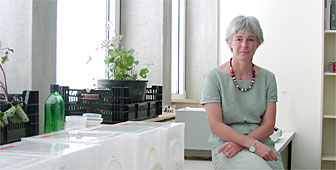
Neuchâtel research centre to focus on plant interaction

The University of Neuchâtel, Switzerland's smallest tertiary institution, is in the top league of plant research. The value of its work was recently confirmed when it netted one of the biggest prizes in national science, becoming one of the country's 14 centres of excellence.
The new centre will focus its research during its 10-year franchise on three domains, with laboratory and field studies. Scientists will look at plant physiology, interactions between plants and ecosystems, and applied projects.
The aim is to provide as wide a view as possible of plant interaction with the environment. “Looking at the interactions surrounding the plant with micro-organisms, with the soil or how it reacts when there is a drought or flooding is important,” said Martin Rahier, head of the new centre.
The researchers will be taking a particular interest in the effects of genetically modified organisms (GMOs) on the ecosystem. The use of GM plants has been hotly debated for the past few years.
Environmental organisations have demanded bans on GMOs, fearing alien genes will spread to the environment, while many farmers see them as a way of improving crop production.
No definitive answers
The research will, however, not be supplying any definite answers about the use of GMOs. “We can only give information and recommendations to the authorities,” Rahier told swissinfo.
The centre has already published its first results, proving genes can be transferred from wheat to wild plants even if the risk is minimal.
Tests of GM plants are planned, but not in an open environment. A special closed lab is being built because of fears that genes from hybrids could spread to other plants.
Research will concentrate mainly on three plants, grapevine, potatoes and tomatoes, all common to the region. “We chose these plants because the expertise needed to study them was readily available here,” Rahier said.
The researchers will also look at plant diseases and search for novel ways of fighting them. The scientists hope to find solutions which do not involve introducing foreign elements into the ecosystem.
The centre is collaborating with institutions outside Neuchâtel. The universities of Bern and Fribourg, as well as federal agricultural stations are taking part in the research.
The scientists hope to pass on the fruits of their research to farmers. The aim, however, is not to make money from the exercise with applied technology, but to generate information which will help improve crop production.
Women in science
The centre will receive SFr14 million from the federal authorities over the next four years. The university will match this funding from its own budget.
Rahier will lead a team of more than 30 scientists. She is also one of the few women science professors in the country, and one of just two heading a national centre.
Despite this, she doesn’t feel she was disadvantaged during the selection process. “Our project was solid and chosen solely on its merits,” she told swissinfo.
Rahier hopes she can be an example to other women academics, although she doesn’t see herself as a feminist. “My career shows that you can be successful as a scientist and have a family as well.”
by Scott Capper

In compliance with the JTI standards
More: SWI swissinfo.ch certified by the Journalism Trust Initiative

























You can find an overview of ongoing debates with our journalists here . Please join us!
If you want to start a conversation about a topic raised in this article or want to report factual errors, email us at english@swissinfo.ch.